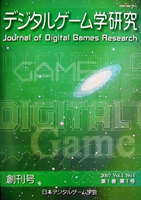Volume 4, Issue 2
Displaying 1-4 of 4 articles from this issue
- |<
- <
- 1
- >
- >|
-
2010Volume 4Issue 2 Pages 1-12
Published: 2010
Released on J-STAGE: October 01, 2019
Download PDF (1104K) -
2010Volume 4Issue 2 Pages 13-22
Published: 2010
Released on J-STAGE: October 01, 2019
Download PDF (1169K) -
2010Volume 4Issue 2 Pages 23-28
Published: 2010
Released on J-STAGE: October 01, 2019
Download PDF (1011K) -
2010Volume 4Issue 2 Pages 47-59
Published: 2010
Released on J-STAGE: July 01, 2021
Download PDF (1125K)
- |<
- <
- 1
- >
- >|
